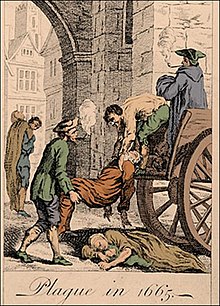
Back Groot Pes van Londen Afrikaans طاعون لندن العظيم Arabic طاعون لندن العظيم ARZ Böyük London vəbası Azerbaijani Голяма чумна епидемия в Лондон Bulgarian Gran plaga de Londres Catalan Velký londýnský mor Czech Pesten i London Danish Große Pest von London German Μεγάλη πανώλη του Λονδίνου Greek

The Great Plague of London, lasting from 1665 to 1666, was the most recent major epidemic of the bubonic plague to occur in England. It happened within the centuries-long Second Pandemic, a period of intermittent bubonic plague epidemics that originated in Central Asia in 1331 (the first year of the Black Death), and included related diseases such as pneumonic plague and septicemic plague, which lasted until 1750.[1]
The Great Plague killed an estimated 100,000 people—almost a quarter of London's population—in 18 months.[2][3] The plague was caused by the Yersinia pestis bacterium,[4] which is usually transmitted to a human by the bite of a flea or louse.[5]
The 1665–66 epidemic was on a much smaller scale than the earlier Black Death pandemic. It became known afterwards as the "great" plague mainly because it was the last widespread outbreak of bubonic plague in England during the 400-year Second Pandemic.[6][7]
- ^ Haensch, Stephanie; et al. (2010), "Distinct Clones of Yersinia Pestis Caused the Black Death", PLOS Pathogens, 6 (10): e1001134, doi:10.1371/journal.ppat.1001134, PMC 2951374, PMID 20949072
- ^ "The Great Plague of London, 1665". Contagion, Historical Views of Diseases and Epidemics. Harvard University. Retrieved 2 March 2015.
- ^ "DNA in London Grave May Help Solve Mysteries of the Great Plague". 8 September 2016. Archived from the original on 9 September 2016. Retrieved 18 September 2016.
- ^ "DNA confirms cause of 1665 London's Great Plague". BBC News. 8 September 2016. Retrieved 9 September 2016.
- ^ Barbieri, Rémi; Drancourt, Michel; Raoult, Didier (2021). "The role of louse-transmitted diseases in historical plague pandemics" (PDF). The Lancet Infectious Diseases. 21 (2): e17–e25. doi:10.1016/S1473-3099(20)30487-4. PMID 33035476. S2CID 222255684.
- ^ "Spread of the Plague". BBC. 29 August 2002. Retrieved 18 December 2012.
- ^ Ibeji, Mike (10 March 2011). "Black Death". BBC. Retrieved 6 November 2023.